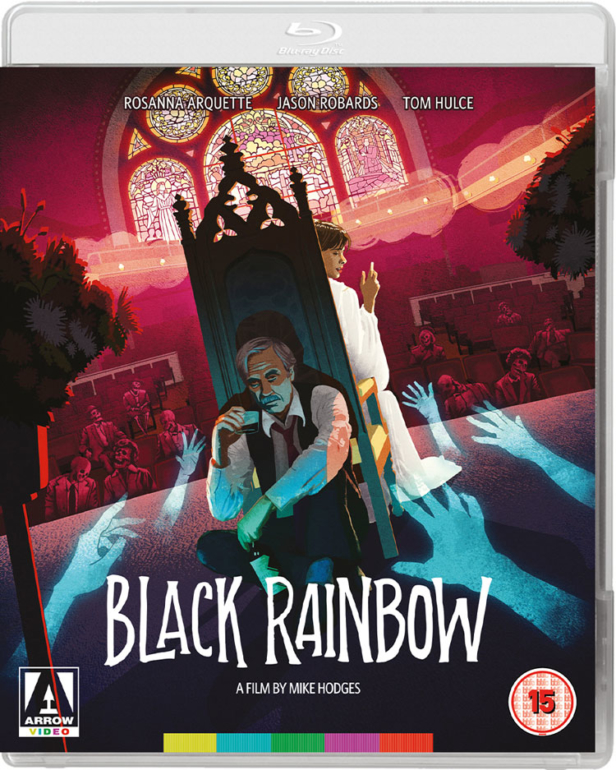Hi Mike, thank you for speaking with us! Where are you spending lockdown?
I’m in Dorset on a farm on top of a hill! We’re okay here, plenty of space thank goodness.
Congratulations on Black Rainbow getting a new lease of life via Arrow Video…
I’m very grateful to Arrow because the distribution of the film in the English speaking world was completely botched up [when the movie was released]. Goldcrest did the distribution deal here with Palace Pictures and America was Miramax, and what we didn’t know was both of them were in financial trouble at the time. This is 30 years ago of course. Palace Pictures needed money so they dumped it on the VHS market six weeks after cinema, despite getting terrific reviews. And in America they didn’t release it in cinemas, they just suddenly dumped it onto a cable channel. So it was never seen.
That’s just what happens! It’s not just about making a film to the best of your abilities. Once you’ve made it, it’s in the hands of other people, whether it gets seen, whether it gets distributed properly, whether it’s published properly. You can understand how Stanley Kubrick became so obsessive because he made sure every element of the film, including the marketing, was made. But I didn’t have that kind of power that Stanley had I’m afraid.
The original trailer is on this new Blu-ray edition of the film, but it makes the movie look more like a standard thriller than a genre film…
Exactly, the poster as well. Because it’s not that kind of film really at all. I can’t remember the trailer, but what I do know is that most trailers I think are dreadful frankly.
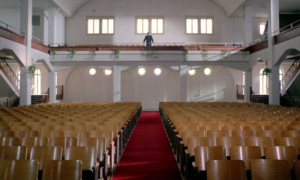
What does Black Rainbow mean? Why did you call the film that?
I was in the Museum Of Modern Art in New York and I’d been there most of the day. I was exhausted and was walking away when a family came in and there was a child on top of her father’s shoulders and she said “look daddy, black rainbow”. And I turned around and there was a huge graphic by Jim Dine (who’s a major American painter) that said ‘the birth of black rainbow’ which is very odd. So that’s where the title came from.
At the beginning [of the movie] when she goes into the empty hall, she talks about the end of the rainbow, that it’s all beautiful and, of course, it’s not – it’s dark. So that’s where that comes from.
Did anything in Black Rainbow change between writing the movie and the finished product?
Not really. When you’ve written the script yourself you have much more license to change things as you go along, to adapt as the story unfolds. I’ve made films written by Paul Mayersberg and Trevor Preston, who are friends of mine, and if I wanted to change something I would never do it without consulting them first.
The two films that got me Get Carter I wrote, directed and produced myself, and I then I wrote Get Carter, Terminal Man and Pulp and I enjoyed that very much indeed. But then I stopped writing scripts until I did Black Rainbow suddenly out of the blue.
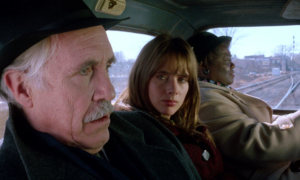
Do you prefer directing movies you’ve written?
Yes. I mean I loved directing Croupier and I’ll Sleep When I’m Dead [which I didn’t write but] I’ve been lucky in terms of enjoying most of the films I’ve made. I had a rough period during the Eighties when films were being re-edited without my permission, things like that. But that’s part of the course of the film industry, it’s a tough business.
Where did the inspiration come from for Black Rainbow?
It sort of accumulated over many years. My first concern was I wanted to find a vehicle for discussing what I thought the future of our society was. It’s quite as simple as that in many ways. It’s ironic that it’s been reissued in the middle of a pandemic. It seems almost suitable. I don’t wish to mean this harshly but in a sense, what Martha was seeing is being realised right now where the pandemic has just blown off the lid and revealed a can of worms, which was always there, [but] which most of us didn’t want to recognise.
Over many years I travelled right across America. I was with World In Action and I was sent out there in 1964. I was in Dallas a year after Kennedy’s assassination, I went to Detroit and interviewed the Reuther brothers at the United Automobile Workers (UAW), and I went to Vietnam all in the same year, so my introduction to America was pretty vivid. And I found myself really disturbed by that form of capitalism and their obsession with communism and socialism.
Then I remember seeing the British medium Doris Stokes on television and I suddenly realised that I could use a medium and I started to play with time. She is actually going ahead in terms of time and therefore I can have her talking about what I think is going to happen, so all of those elements came together.
The whole thing [in the movie] with the assassination through the window came to me really from the Reuther brothers. They were the creators of the UAW and both of them were shot by G-men through their windows. One of them lost an eye. And on my travels around small-town America, I would buy the local newspaper (they would always have wonderful names) and an enormous number of them carried stories about foremen or workers being beaten up or even murdered and when upon there was an investigation they usually found they were going to whistleblow on health and safety. So really all of these elements came into play when I was writing the script.
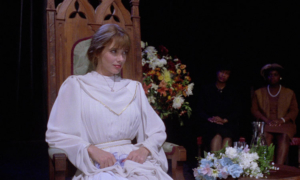
Where did you shoot the movie?
I shot pretty well all of it in Charlotte which is in South Carolina and Charlotte was a city on the cusp. At the centre you had this jewel of a modern city and then it was surrounded by poverty and decay. Weirdly enough it’s very similar to Get Carter in many ways. I caught Newcastle [where the movie is set] again on the cusp. As a film director, it’s always interesting to me when you sense the future [of a town] but the whole business of corruption is based on inequality and poverty.
Also if you look at Carter, it could take place almost at any time from the Forties onwards because Britain was very slow to change for obvious reasons after the Second World War and Charlotte was the same. They both look sort of timeless in many ways.
Do you find that entertainment mediums are a good platform to discuss certain social commentaries?
Absolutely. I’ve always thought, especially with the American writers like Chandler and so on, that their books – thriller books, detective books or whatever – was a kind of an analysis of society as they found it. And I think it’s a great vehicle to examine what’s going on.
Can you tell us about shooting the medium scenes?
I tell you one of the revelations for me was the audience. All those people came from the Carolinas and I thought they were just amazing. They were so attentive and they were so moved by what was happening, they play a major role in this film. I’d forgotten how wonderful they all were.
So the medium scenes were shot with the audience actually there?
Oh yes, there were audiences there. I did some work with Rosanna [Arquette who plays the lead character Martha] on the stage when it’s just her on her own, but the whole of the thing was always played to an audience when I was filming. It was really interesting because they were incredibly moved by Rosanna. You often see people crying during it from her performance. They were amazing.
Had you seen any mediums before writing or shooting Black Rainbow?
No. Doris Stokes was the major one. There was a documentary film on her and I was able to watch it all the time so I could learn quite a lot from watching her technique. I didn’t show it to Rosanna ever. So she came to it in her own way.
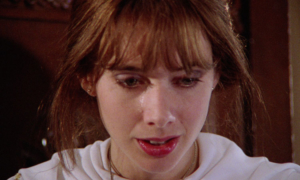
There are some very complex characters in Black Rainbow – how closely did you work with the actors on characterisation?
Jason Robards [who played Martha’s father Walter], he’s just wonderful. He just knew that role because he’d done so many Eugene O’Neill productions on Broadway. Also earlier he’d been a serious alcoholic and he stopped some years earlier. So he knew the character
Rosanna, we had a problem, but that was largely my fault because I think she misinterpreted the script. I filmed the very first medium session with an audience and then I realised that I’d read her the wrong way in the script. She has appear to be hearing the voices from behind the chair, it’s very imperative. But she just played it straight to the audience. And I had a sleepless night that night as I realised it was a mistake, she had to appear to be hearing the loved ones talking to her. I then had to tell her that I was going to have to shoot it all again and she got very upset at me. I’m not surprised. She said the audience were all moved, some of them were crying, I said yeah but unfortunately that’s not the point. The point is, the people viewing the film are not going to see the audience all the time and that doesn’t mean anything if you moved the audience because we’ve got to get it that you’re hearing the loved ones talking to you or revealing themselves to you.
Then Tom Hulce [who played journalist Gary] he’s just terribly good. It’s a showy part in the film but he’s incredibly solid as an actor. I don’t know what’s happened to Tom, he seems to have just sort of vanished but there you are.
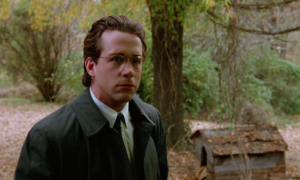
The ending of Black Rainbow is very ambiguous…
I must confess it was a last-minute thought for me that end scene, it wasn’t in the script initially. [Martha has her own] time bubble – the first time you see her she asks what the time is and her watch is wrong, and she does it again with her father when she thinks she should be in the hall. Once I had built in that idea of time-shifting, it sort of progressed.
[The film] starts with Kudzu which is a weed. When I went to the southern states in America I was absolutely fascinated by this weed and the very first line of the film is “Goddam Kudzu!” – meaning nothing can destroy it. In the southern states you see many wonderful houses that have gone into decay, you could be in Gone With The Wind.
Towards the end of the movie, you think that time is speeding when Gary goes to Martha’s shack and takes the photographs. But by the time the photographs have processed, time has shifted on and the Kudzu has just come along and climbed all over [the shack]. And then he goes back to the shack and just disappears into the Kudzu. I was very tempted to have Tom say the line “you’ve stolen my life!” like Martha said to her father but I resisted doing that and I’m glad I did. In a way, [the ending] represents that when we’re all departed, nature will just take over. Everything will become a jungle if Kudzu had its way!
Black Rainbow is out now from Arrow Video.
